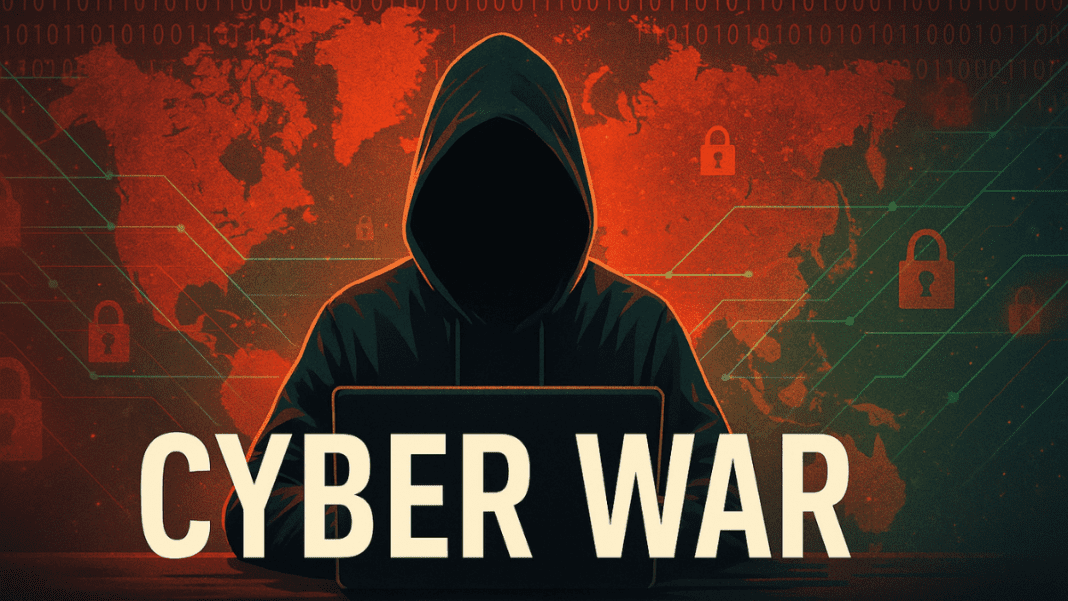The Digital Frontlines of Modern Conflicts
Today, wars are no longer confined to battlefields with tanks, aircraft, or soldiers. A new type of war is being fought behind the screens—silent, invisible, and deadly. This is cyber war. It is not a prediction of the future, nor is it a storyline from a sci-fi movie. It is happening right now. From the Russia-Ukraine war to the Israel-Hamas and Israel-Iran conflicts, cyber attacks have played a major role in how these battles unfold.
Governments are now using computer systems to spy on each other, disable power grids, disrupt communications, or steal sensitive data. These attacks are not carried out by lone hackers but by state-sponsored groups with clear targets and military-style strategies. Cyber war has become so critical that NATO, a global defense alliance, has officially named cyberspace its fifth domain of warfare—alongside land, sea, air, and space.
Unlike regular hacking or cybercrime, cyber war involves digital attacks carried out by one nation against another, aimed at sabotaging critical systems or collecting state secrets. The goal may be to slow down a military response, confuse the public, or destabilize an entire government—all without firing a single bullet. These attacks can shut down hospitals, black out cities, or disrupt emergency services, making them just as dangerous as physical weapons.
Legal Grey Zones and the Problem of Proof
One of the biggest challenges in cyber war is figuring out how international law applies. The rules of war were written for bombs and guns, not for lines of code. While many countries, including the United States, believe that traditional laws of war apply in cyberspace, there are still many unclear areas.
One such problem is attribution. In simple terms, it’s hard to say with certainty who launched a cyber attack. A cyber attacker can route an attack through many different systems, using fake identities or stolen networks. This makes identifying the true source nearly impossible without strong evidence.
Another complex issue is defining what counts as a cyber weapon. When does a digital action become a military attack? If a virus simply collects data, is it espionage? But if it shuts down a power grid, is it an act of war? According to many experts, a cyber attack is considered an act of war only if it causes serious damage—such as deaths, destruction of important systems, or long-term disruption of essential services.
Hackers Steal Digital Gold Worth ₹1.95 Crore on Aditya Birla’s Finserv App
To make sense of this, the U.S. Department of Defense separates cyber operations into three types. Computer Network Attacks (CNA) are those that damage or destroy systems and fall directly under cyber war. Computer Network Exploitation (CNE) refers to spying or secretly collecting information, while Computer Network Defense (CND) includes protective measures. Only CNAs that cause destruction or major disruption can be considered true acts of cyber war.
NATO’s Article 5, which states that an attack on one member is an attack on all, originally applied only to conventional attacks. However, after the cyber assault on Estonia in 2007 and other similar incidents, NATO has acknowledged that a severe cyber attack could also trigger this rule.
Building Digital Defenses and Writing the Rules
In response to these rising threats, many countries have begun drafting laws and building stronger digital defenses. Across Europe, regulations like the NIS Directive, the G7 agreements, and especially the Tallinn Manuals provide guidance on how countries should handle cyber attacks. These documents do not create new laws but explain how current international laws apply in the digital world.
Italy has taken several steps to protect its critical systems. Law 133 of 2019 established a national cybersecurity perimeter to protect important sectors like health, transport, and finance. It requires these organizations to follow strict security rules and report any cyber incidents. Law 109 of 2021 created the National Cybersecurity Agency (ACN), a central body to monitor threats, coordinate responses, and promote secure technologies. The agency also educates the public and trains cyber professionals.
Cyberattack Exposes Melbourne Hospital Patients Data on Dark Web
But while legal frameworks are slowly being built, the psychological side of cyber war is growing even faster. Disinformation campaigns and fake news spread online like wildfire, confusing the public and creating division. Social media platforms become battle zones, and citizens often don’t even realize they are part of a digital attack.
Cyber war is not just about hacking into computers—it’s about power, politics, and control in a world that is increasingly dependent on technology. And though it’s mostly invisible, its impact is dangerously real.





